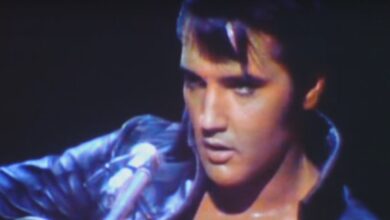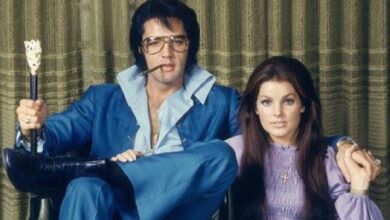Six decades on, Elvis’s track endures, maintaining its timeless resonance
“The Girl of My Best Friend” is a timeless piece in Elvis Presley’s extensive repertoire, released in 1960 as a single and featured on his album “Elvis Is Back!” Crafted by songwriters Beverly Ross and Sam Bobrick, it weaves a poignant tale of inner conflict, delving into the complexities of love and friendship. This composition is notable not only for its compelling narrative but also for its rich musical arrangement, blending elements of rock, pop, and ballad seamlessly to create a captivating listening experience.
Elvis’s rendition of “The Girl of My Best Friend” serves as a testament to his exceptional vocal prowess and his innate ability to convey intricate emotions with authenticity. Through his smooth and soulful delivery, he captures the essence of longing, desire, and inner turmoil, immersing listeners in the heartfelt narrative of the song. The melodic structure, accompanied by the gentle strumming of guitars and soft harmonies, further enhances its allure and enduring charm. It’s a testament to Elvis’s artistry that he can interpret the song’s emotional depth so convincingly, making it resonate deeply with audiences.
The song’s impact was profound, catapulting it to the Top 10 on the Billboard Hot 100 chart and solidifying Elvis’s versatility as an artist. His seamless transition between various musical styles, from rock and roll to ballads and pop-infused melodies, showcased his ability to captivate listeners across diverse genres. The universal theme of “The Girl of My Best Friend” struck a chord with audiences, cementing its status as a beloved classic in Elvis’s illustrious discography. Its enduring popularity is a testament to its timeless appeal and the enduring legacy of Elvis Presley.
Throughout his career, Elvis had a remarkable instinct for selecting songs that resonated deeply with his audience. “The Girl of My Best Friend” is a prime example of his ability to tap into universal emotions, exploring themes of love, friendship, and forbidden desires with sincerity and depth. This innate connection with his audience contributed to the lasting impact of his music and solidified his status as a cultural icon.
Born on January 8, 1935, in Tupelo, Mississippi, Elvis Presley rose to prominence in the mid-1950s with his groundbreaking blend of rockabilly, rhythm and blues, and country music. Signing with Sun Records and later RCA Victor, he quickly became a global sensation, with hits like “Heartbreak Hotel,” “Hound Dog,” and “Jailhouse Rock” dominating the charts and earning him the title of the “King of Rock and Roll.”
In addition to his musical achievements, Elvis pursued a successful film career, starring in over 30 feature films that showcased his versatility as an entertainer. Films such as “Love Me Tender” and “Viva Las Vegas” further solidified his status as a cultural icon and expanded his influence beyond the realm of music.
Despite his immense success, Elvis faced personal struggles, including health issues and the pressures of fame, which ultimately contributed to his untimely death on August 16, 1977. However, his impact on music and popular culture endures to this day, inspiring countless artists and continuing to resonate with audiences worldwide.
Elvis’s influence extended far beyond his music; he played a pivotal role in the cultural revolution of the 1950s and 1960s. His rebellious image, distinctive fashion sense, and groundbreaking performances challenged societal norms and paved the way for future generations of artists. Decades after his passing, Elvis’s music remains as relevant and impactful as ever, a testament to his enduring legacy and lasting imprint on the world of entertainment.



